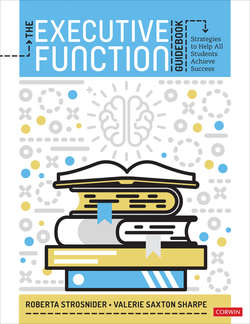Читать книгу The Executive Function Guidebook - Roberta Strosnider - Страница 13
На сайте Литреса книга снята с продажи.
How Do ALL Students Benefit From Executive Function Skills Training?
ОглавлениеExecutive function skills are essential in the successful completion of life’s everyday tasks. Children are not born with executive function skills, but they do have the ability to develop these skills through explicit instruction. The teaching of such skills may begin as early as preschool. As teachers and administrators, it is important to have proof that explicit training of executive function skills has proven to have positive outcomes. Sasser, Bierman, Heinrich, and Nix (2017) developed the REDI Program, which focused on teaching preschoolers the prereading skills necessary for school success in combination with the social skills needed for getting along with people. Three hundred sixty-five preschoolers from forty-four Head Start programs throughout Pennsylvania participated in this study. Participants’ executive function skills were assessed prior to the skill training. The participants were classified as having either low, medium, or high executive function skills. Students were randomly selected for the control group or the REDI group. The prereading and executive function skill training intervention was then performed. Results showed that children with low executive function skills in the REDI group had less of a decline than those in the control group. This trajectory was sustained through the third grade.
A longitudinal study, Executive Functions Deficits in Kindergarten Predict Repeated Academic Difficulties Across Elementary School, conducted by Morgan et al. (2018) was presented at the American Educational Research Association (AERA) 2018 annual meeting. The study tracked 11,000 kindergarten students through the third grade. A major finding of this research was that children who exhibited executive function difficulties in kindergarten, regardless of their race, socioeconomic level, or academic abilities, continued to experience academic difficulties in later years. The authors concluded that early intervention efforts are necessary before children internalize negative feelings about their academic performance and exhibit problem behaviors.
Diamond and Lee (2011) found that executive function skills training not only improved school readiness but positively impacted academic success in students ages four through twelve. As well, executive function skills continue to predict reading and math aptitude throughout a student’s school and life experiences.
Currently, most students do not receive explicit instruction in executive function skills. Indeed, students struggling with these skills are often advised to try harder, pay attention, and behave. The students may try to do better, but without the right interventions, they do not know how to improve these skills. As time goes on, the difficulty they experience with executive functioning keeps dragging them into a downward spiral, and they become more and more reluctant to try.
Some students may begin a downward spiral as early as preschool. If this spiral is not stopped, it may result in retention, or worse—dropping out. While there are usually multiple reasons for poor student outcomes, there is often a similar pattern for students with executive function weaknesses. These students may
not understand all the demands made upon them,
find it difficult to pay attention,
have troubling remembering what they have been taught,
not always follow the rules,
find it difficult to get along with others, or
not begin work in a timely manner.
When we and parents fail to recognize these characteristics as pointing to executive function deficits, we sometimes wrongly assume that the student is simply not trying and is not well behaved. This in turn may lead to the student feeling that
we do not care for him or her.
the demands being made upon him or her are too hard, too easy, stupid, confusing, not meant for him/her, for example.
he or she can do better and will try harder.
he or she does not want to attend school any longer.
he or she might as well not try, because success is not possible.
As time goes on, the downward spiral continues (see figures 1.2 and 1.3). While the school may implement academic interventions, these are often inadequate because the issue of executive function is not specifically addressed. Meltzer (2007) suggests you pay attention to a student’s difficulties in executive function skills as early as preschool.
FIGURE 1.2 What Does the Downward Spiral Look Like?
FIGURE 1.3 How to Stop the Downward Spiral—Reframing One’s Thinking
